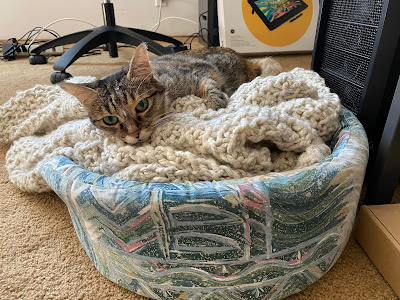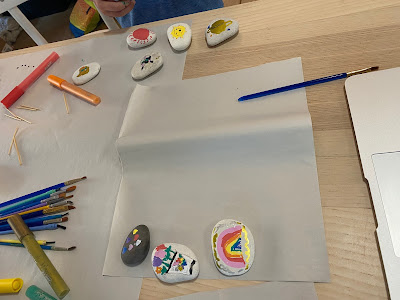Pages
Tuesday, June 29, 2021
Countering "Dumb"
Monday, June 28, 2021
#MicroblogMondays: Grumpy
Not sure what #MicroblogMondays is? Read the inaugural post which explains the idea and how you can participate too.
A Grumpy Poem
I wrote a grumpy poem
And this is how it goes
GROUCH!
GRRRR!
HURMPH!
SQUINT!
SCRUNCH!
STOMP!
SLAM!
That is how my grumps go
From my head down to my toes!
~By Daniel, age 5, link here
Wednesday, June 23, 2021
Haunted
One of Jaxson's hallmarks was the unique way he would wake Grey and me up early every morning. As a young cat, this was him finding the spot in the hallway where the acoustics were perfect to echo his meows throughout the condo (and on some days, throughout the building). In Boston, he turned his attention to shades, rattling them just right. But the house in California brought sliding glassdoor blinds into his repertoire, adding a distinctive 'clacking' sound as he would pass his tail along them, with the only relief from the madness being to open the door and release him into the pre-dawn to explore.
Daisy, though enjoying the outdoors, was not a dawn kitty. While Jaxson loved the mist and the cool air, she was content to lay in her bed, saving her exploits for later in the day or evening.
All that changed after Jaxson died, with Daisy taking up his morning routine, driving both Grey and me a bit insane.
This change isn't the only thing I've noticed since Jaxson passed. I catch glimpses of a black and white form in the garden most days, lingering in the areas that I regularly tend. Cupboard doors for cabinets he used to explore have been left ajar. And despite my neighbors complaining of rats, we haven't had a single one (note that Daisy is not a mouser).
Ghosts have been on my mind as of late, particularly with stories about people being visited by loved ones who died from COVID. For some, the experience is terrifying, but hearing about others describe the peace they feel with those contacts, allowing them closure, has been heart-warming and reaffirming in my long-held belief that those we love never truly leave us.
I don't know how long the haunting will continue. A part of me hopes it will be for a long while, even though the sightings and strange occurrences are happening less. For now, all I can do is treasure the signs, hoping that this ghost can sense how deeply he is loved and missed.
Tuesday, June 22, 2021
#MicroblogMondays: And life goes on
Not sure what #MicroblogMondays is? Read the inaugural post which explains the idea and how you can participate too.
Thursday, June 17, 2021
Daisy
She sleeps in his spots. Gathering the objects that were his close by her. For a week after he passed, she slept for most of the day, refusing to be comforted or cuddled. Even now, she sleeps more than she previously did, though she smiles when in the areas that smell of him. Her grief is visible but very unique to anything I've ever witnessed.
I don't talk often about Daisy on her own. Jaxson was a larger-than-life individual who easily drew attention. But that doesn't mean that Daisy is in any way a shrinking violet, which was evident when you saw the two of them together. There's was one of the longest relationships I know of, with a bond that still runs very deep.
The foundation of that bond came from their introduction. Jaxson came into our lives shortly after Grey and I were engaged and he was our only cat for about 6 months following the loss of my first cat. As I watched him in the evenings, bored out of his mind, I knew a companion was needed, but Jaxson also didn't do well with other animals. Intent on controlling his territory, I knew it would take someone who wouldn't put up with his BS.
We found Daisy the day after we returned from our honeymoon. The trip to the shelter was spent playing with kittens and meeting many cats, but it was Daisy (named Apricot at the time) who caught Grey's attention. The next day of formalizing her adoption, which should have been the simple part, was an adventure. We arrived at the shelter to him a guy bellowing at the animal control officer about how he wanted his dog Boomer back. The officer was clearly pissed (frankly, I'm amazed she didn't stick him in a cage), and when she got to us, turned her frustration onto me. After navigating the madness in the front, which was freaking everyone in the shelter out, and packing up this tiny cat, we found ourselves on driving home. It was then that Grey commented on Daisy's size and said "we may have to bring her back if Jaxson hurts her."
Those words would haunt us for the next week, given how stupid we were with introducing Daisy to Jaxson. Instead of giving her her own space to acclimate, we immediately let her explore the entire apartment, with Jaxson hot on her heels, growling the whole way. We were woken at 2 am to witness our stupidity with us witnessing Daisy beating the snot out of Jaxson. She had turned into a hellcat and could literally toss him across the room, which shocked all three of us. This continued for a few days, despite separating her from him, with the final straw being finding him cowering in the corner of the kitchen with a scratch across his nose while she was actively hunting for him.
The vet immediately diagnosed her with PTSD and prescribed Valium. For three days, Daisy laid on the couch in a semi-conscious state. And that's when things changed as Jaxson took that time to lay beside her, grooming her and making nice. When we stopped the meds, she returned the affection. From that day forward, they were inseparable, with her kicking his butt if he ever crossed the line or was too much of a jerk.
Wednesday, June 16, 2021
Raising orchids
With Jaxson's death and mourning his passing, Maddy and Teddy have been very involved with the process. They were in the room before he was euthanized and saw his body after he passed, allowing them to see that death could be peaceful as well as final. In the days following his death, they've both talked about him, expressing their sadness, created art of him and for him, talked openly about being sad, and made a point of spending time with Daisy as she has been grieving. We've cried together, talked about souls and beliefs about the afterlife, and begun a discussion about living well.
What's been shocking has been others' responses to what they are observing, with both kids mourning well when so many have been afraid of what their response would be. I've encountered anger from others with this shock, as beliefs are being challenged (and in one case repressed grieving has surfaced), but generally, the observations have been openings to conversations. There's been a lot of good that from this experience, despite a terrible loss.
Monday, June 14, 2021
#MicroblogMondays: Missing him
Not sure what #MicroblogMondays is? Read the inaugural post which explains the idea and how you can participate too.
Wednesday, June 9, 2021
Beloved
You died on a Tuesday afternoon. And we are making plans for the garden where your ashes will be spread. The house feels so empty without you. The energy is so different without you here and my body aches with the knowledge it won't feel your softness pressed against it.
I never expected the journey we would have together; surviving graduate school and all the change that came from that process. Then there were the darkest years of my life of living through infertility, repeat losses, and having "family" turn its back. Those moments when the only lifeline I had was having you curl up beside me. I never thanked you for saving me during that time, reminding me that I was loved and that life was still worth living, even if it looked different than what I had planned for.
You shifted with me again when the kids arrived, ending one chapter and opening a new one. Reluctant at first to welcome these two odd creatures, you quickly claimed them both, watching over them navigating this world. You were the calm during the storm of two major moves for our family, first to the East Coast and later back West, working in tandem with Daisy to turn whatever space we occupied into a home.
I miss your facial expressions. Being greeted by you every morning with a meow that was uniquely yours. Spending evenings with you on my lap, insisting on being pet. During this past year, doing all my teaching with you close by, routinely putting a paw on me to let me know that you were there and all would be alright in a world that most certainly wasn't.
I knew the end was coming. After finding that growth on your body, it was only a matter of when. Still, I wasn't ready for the news that the cancer had spread throughout your body. I didn't want to let you go despite all the signs you were giving me that it was time.
Yesterday, you woke me at 4 am to go outside to watch the sunrise one last time. Daisy joined you, which was unusual for her, so I knew you both understood what was happening. You then taught with me one last time, pressing your head to my leg during the moments I felt less sure. Giving me that look I know so well that was telling me everything would be alright.
Your parting gift to me was you allowed me to hold you as you died. You trusted that I would let you go, even though I desperately didn't want to. Despite snarling at the vet, making it clear you would happily bite them, you allowed me to put my arms around you and touch you while they administered the drugs that would stop your heart. You breathed your last breath while I stroked your body; a sigh that released your soul and allowed you to be free.
You've left behind so many beautiful memories of a life well-lived. A life where you brought so much love, comedy, adventure, and grit. I can't begin to tell you how much you are missed already. Daisy is visibly heartbroken not to have you here, Maddy and Teddy swing between laughing about the memories of you and crying because you are gone. Grey and I are physically numb. My being hurts from the knowledge that you're no longer here.
I don't know how to live my life without you in it, my beloved. This next chapter without you in it terrifies me. But I also know that you expect me to continue living and living in the manner you taught me to. That doing anything less is not an option as your lessons are firmly engrained.
I love you so much Jaxson; I always will. Thank you for choosing me. Thank you for loving me. Thank you for pointing me to the light.



















